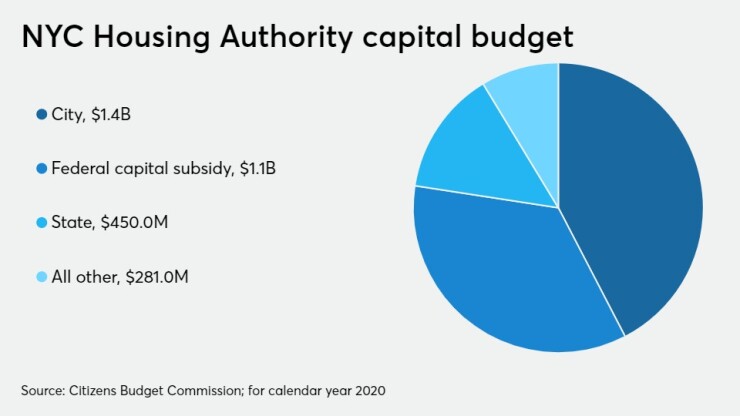The New York City Housing Authority’s management agreement with developers on $1.5 billion of capital repairs marks a major step toward the goal of private management of up to one-third of its units.
City officials are looking to convert at least 62,000 public housing units to rental housing developments under the federal Section 8 program by the end of 2028.
Privatization is also a flashpoint. While

NYCHA on Thursday announced the selection of five development teams that will partner with the authority under the Permanent Affordability Commitment Together, or PACT, program to preserve nearly 6,000 units in Manhattan and Brooklyn with critical infrastructure and capital repair needs.
PACT is a pillar of
The authority, long a strain on city operating and capital budgets and with a track record of fiascoes and mismanagement, has been operating under a federal monitor, Bart Schwartz, the past year.
Gregory Russ, NYCHA's chief executive since August, called Thursday’s designations “an essential milestone” for the authority.
Howard Cure, director of municipal bond research for Evercore Wealth Management, called private-sector involvement vital for NYCHA.
“I really don't think the city has the financial capabilities, nor do I think the state is in a position to help in really rectifying this tremendous backlog of capital needs,” Cure said.
NYCHA’s first privatization was the 1,400-unit Ocean Bay Apartments in Far Rockaway, Queens, in 2017. That $560 million undertaking involved federal, state, city and private funding.
Residents last October protested about privatization at the Holmes Towers on the Upper East Side, fearing that lower-income persons could more easily lose their apartments.
NYCHA has estimated its five-year capital needs at $31.8 billion.
The teams — more than a dozen affordable housing developers, property management companies, and nonprofit organizations including L+M Development Partners, Hudson Companies, Wavecrest Management and Settlement Housing Fund — submitted proposals for the renovation of Williamsburg Houses, Linden Houses, Boulevard Houses, Harlem River I and II Houses, Audubon Houses, Bethune Gardens and Marshall Plaza.
NYCHA announced the restoration initiative last September after vetting the selected entities as pre-qualified partners in May 2019.
For all PACT transactions, the New York City Housing Development Corp., the city’s municipal housing finance agency, will coordinate or provide loan financing funded by taxable or tax-exempt bonds issued through their multifamily housing bond resolution or the nascent housing impact bond resolution, a bond resolution created solely to enhance NYCHA transactions.
The selected development teams will use several methods to convert operating subsidy to Section 8 and finance the 20-year capital needs at these NYCHA developments, including the Rental Assistance Demonstration, or RAD, program, Section 18, and the Part 200 disposition processes federal housing law has established.
NYCHA said its officials will work with the designated development teams and residents to identify social service providers interested in collaborating with the authority on key areas such as resident outreach, family partnerships, health initiatives, and NYCHA’s Office of Resident Economic Empowerment and Sustainability.
The authority serves nearly 400,000 residents or about 5% of the city's population.
Shola Olatoye resigned as its chief executive under pressure in April 2018 amid reports of poor living conditions and a city Department of Investigation report that accused Olatoye and her staff of lying about lead-paint certifications and mold statistics to federal regulators.
In January 2019, NYCHA, the city, and the U.S. Department of Housing and Urban Development reached an agreement that will require the city to provide an additional $1 billion in capital support over four years and $200 million per year thereafter.





